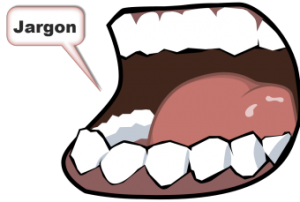Jargon - the language of science: Difference between revisions
mNo edit summary |
mNo edit summary |
||
| Line 1: | Line 1: | ||
{{Rinfo | {{Rinfo | ||
|title= Jargon - the language of science | |title= Jargon - the language of science | ||
|topic= | |topic=Language | ||
|image=Jargon-imagebot.png | |image=Jargon-imagebot.png | ||
|tagline=What colour is lime water? How the science language confuses | |tagline=What colour is lime water? How the science language confuses | ||
Revision as of 15:35, 13 September 2012
This resource may not be final.
Lesson idea. In this audio file, science teacher and dictionary author Dr William Hirst explains that learning the language of science can improve children’s success at school.
Teaching approach. This resource was made for general public interest but may find use as a discussion starter in teacher education. (edit)
| Resource details | |
| Title | Jargon - the language of science |
| Topic | |
| Teaching approach | |
| Learning Objectives |
|
| Format / structure | Audio podcast - 14 minutes mp3 |
| Subject | |
| Age of students / grade | |
| Table of contents | |
| Additional Resources/material needed | |
| Useful information | Edited from The Science Show on Cambridge 105 FM |
| Related ORBIT Wiki Resources | |
| Other (e.g. time frame) | |
| Files and resources to view and download | Radio - audio: Introduced by Roger Frost (1 minute) - Interview William Hirst (14 minutes) Right click to Save. Or click to use |
| Acknowledgement | |
| License | |
Questions - Discussion prompts
Learning the language of science – science teacher and author Dr William Hirst talks to Roger Frost. William explains that learning the language of science can improve children’s success at school. He is the author of a science dictionary for ages 10 -14 called “William’s Words in Science” (www.williamswords.co.uk)
- Gives examples of generally shared science words that can cause confusion
- Suggest a science word that might have multiple meanings in science? [As many as ‘eighteen different meanings’ mentioned later]
- What can you say about the quantity of words and meanings required for science at age 14
- What does Dr Hirst mean by active and passive vocabulary?
- Can we make use of the analogy with learning a language?
- How can science language be acquired? What strategies might be used for teaching words?
- What is the value to young children of science’s language, here called ‘jargon’?
- Is learning a word, like phototropism, crucial to understanding the idea?
- What does ‘apple’ mean to you as a concept - and does it match another's idea?
- Discuss approaches to teaching words in science?

